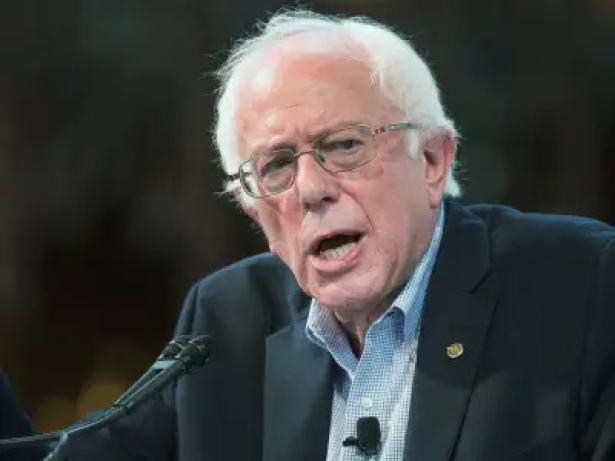‘Corporate Media Will Always Side With CEOs’: Sanders Rips Coverage of Looming UAW Strike
U.S. Sen. Bernie Sanders on Tuesday blasted corporate media coverage of United Auto Workers' contract demands and looming strike, echoing a video released last week by the UAW amid negotiations with vehicle manufacturers Ford, General Motors, and Stellantis.
A short list of media conglomerate control the vast majority "of what the American people see, hear, and read," and that is clearly on display with the labor conflict between the union and the "Big Three," Sanders (I-Vt.) argued in a statement, highlighting that "the major reasons as to why autoworkers might go out on strike have been rarely, if ever, the focus of the corporate media's coverage."
"In the first half of 2023, the Big Three automakers made a combined $23 billion in profits—up 80% from the same time period last year," Sanders noted. "But if you've watched any corporate news coverage of the pending strike by 150,000 autoworkers, you've heard more about the strikes' potential negative effects on the economy and a litany of excuses why very well-compensated CEOs just can't make a fair deal."
The chair of the Senate Health, Education, Labor, and Pensions (HELP) Committee continued:
You won't hear that last year the CEO of General Motors raked in about $29 million in total compensation, the CEO of Ford made approximately $21 million, and the CEO of Stellantis pocketed over $25 million. In fact, over the last four years pay for those CEOs has increased by more than 40%.
You won't hear that over the past decade these same companies made some $250 billion in profits in North America alone.
You won't hear that the average starting wage at the Big Three today is around $17 an hour—less than a number of nonunion auto plants around the country—and that the top wage is $32.32 an hour.
You won't hear that, unbelievably, over the last 20 years, the average wage for American autoworkers has decreased by 30% after adjusting for inflation.
You won't hear that autoworkers at the Big Three are earning less today than they did 15 years ago.
"Of course, none of this is new. The corporate media will always side with CEOs and shareholders," he added. "Despite what you might hear in the corporate media in the coming days, what the UAW is fighting for is not radical. It is the totally reasonable demand that autoworkers, who have made enormous financial sacrifices over the past 40 years, finally receive a fair share of the record-breaking profits their labor has generated."
Along with his statement calling out the corporate media, Sanders on Tuesday published an opinion piece in The Guardian urging Americans to "stand in solidarity with the UAW and create an economy that works for all, not just the privileged few."
In the event of a strike later this week, "the UAW members will be fighting not only for themselves but against a corporate culture of arrogance, cruelty, and selfishness causing massive and unnecessary pain for the majority of working families throughout the country," the senator stressed. "Their fight against corporate greed is our fight. Their victory will resonate all across the economy, impact millions of workers from coast to coast and help create a more just and equitable economy."
Sanders' remarks follow a September 7 video in which UAW president Shawn Fain spends about four minutes debunking a recent "NBC Nightly News" story, calling out corporate media coverage more broadly, and sharing some facts about the industry.
"You don't see big, splashy nightly news segments on how consumers will be impacted by companies choosing to spend billions on executive salaries, and stock buybacks, and special dividends," Fein said. "You only hear these concerns when the working class stands up and demands a fair share of the value we produce."
"But the autoworkers and working people of this country know what's really going on. We live it," he explained. "We know firsthand what it's like not to be able to afford the cars we produce. We know what it's like to live paycheck to paycheck while the companies we work for make out like bandits. We know what it's like for our communities to be decimated and our families to be torn apart by plant closures."
The UAW announced last month that 97% of participating members at "Big Three" voted to authorize a strike if a contract deal isn't reached by September 14.
Jessica Corbett is a senior editor and staff writer for Common Dreams.


Spread the word